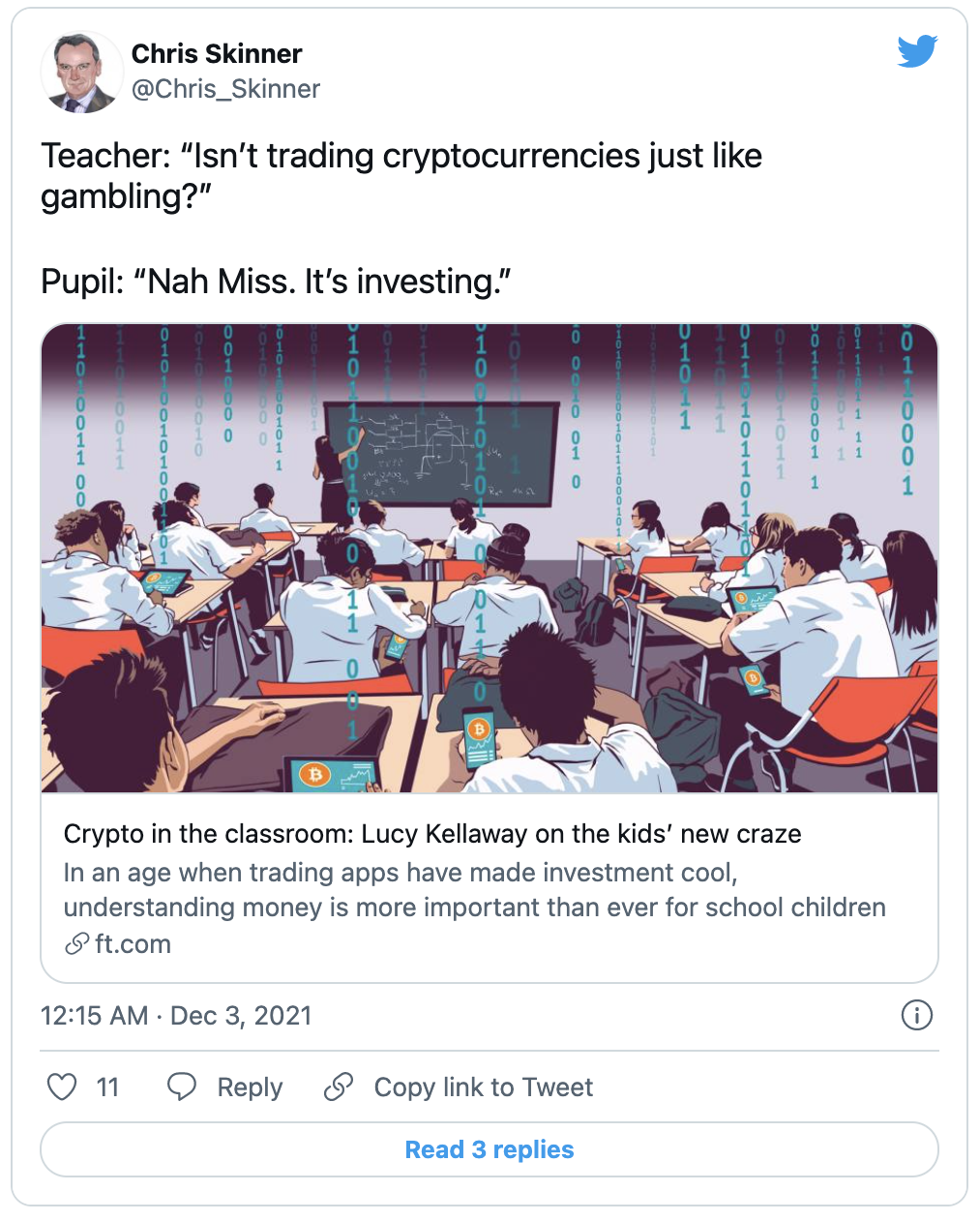“When I was a lad, I got four shillings and sixpence every week for pocket money.”
“Luxury! I was whipped in two by my dad and lived in a shoebox by the motorway!” says my friend.
OK, enough revival of old Monty Python sketches, but the point is that children do need to know about money. They need to know about how money works, the value of saving, the cost of credit and the risk of not paying it back. Do they know? I’m not sure, as so much is left to parental control and most parents have no control. Well, no control over money.
This came to mind with some discussions around children and money.

Kids think crypto is fun, as they wake up every day and the money goes up. But what happens when it doesn’t?
I ask how he would feel if the market crashed and he lost everything. “Sad,” he said, but then he added: “but that’s not going to happen — if it goes down one day, it’s going to go up again.”
Source: The FT
Hmmm. Children are losing the sense of reality, as pointed out in another FT article:
Even at her tender age, my niece has worked out that tapping contactless cards on payment terminals is a medium of exchange. Naturally, she wants to be the one to tap my card.
I am all for giving children early exposure to money and payments, but what worries me is the invisibility of digital transactions versus the physicality of notes and coins.
Source: The FT
Equally, it is becoming easier and easier to trade and transact without noticing what it is we are trading and transacting.
My wife handed over about £100 for nothing of value because her technology made it so easy. She didn’t notice the disclaimer because she was distracted and multitasking.
Source: The FT
And children clearly do not understand this. In fact, most parents don’t.
“My daughter was really upset when we told her about the financial consequences. She thought she was playing with monopoly money – it didn’t seem real to her. How can these companies be allowed to trap minors in these games? To trap people who are vulnerable?” he said.
Source: The BBC
I guess this last point brings it home. Money is no longer real.
When I was a lad, we had a holiday where I wanted to buy things I couldn’t afford. My mum and dad eventually relented, after countless crying and whinging sessions, and gave me the cash to buy what I wanted. But I had to dig the garden, clean my room, do the dishes and wash the car for six months after.
Today?
What do our kids know today?
What do our children’s children know?
Do they understand money? Do they understand how it works? Most important, do they know what debt means? Do they know what happens when you can’t payback?
When money was real, and you had notes and coins, you could see what you were spending. Today, money is just data and numbers. It’s no longer real. Yet it is real, when it comes to payback. Do our children know this?
It’s a bit like asking do you know it’s Christmas? Do they know it’s Christmas? Do they know it’s money?
We really need a focus on financial literacy and sure, there are companies doing that. The FT article quotes Starling and NatWest with Rooster, but surely we need this as a core topic of dicsusion in the school syllabus.
It’s in their somewhere, but it’s not a core topic that was in my school curriculum. Was it in yours?
Meanwhile, if you want it to be in your radar and place, then GoHenry is a good start: We created GoHenry with the goal of helping kids learn about money in a practical, fun way and provide all the tools to help parents nurture healthy financial habits in their children.
In a similar way, I’ve spotted Playmoolah and others all trying to create great interactive and playful ways to educate kids about money. This is a core focus, or should be, of every parent. After all, do you want your kids to be out-of-contorl of money?

